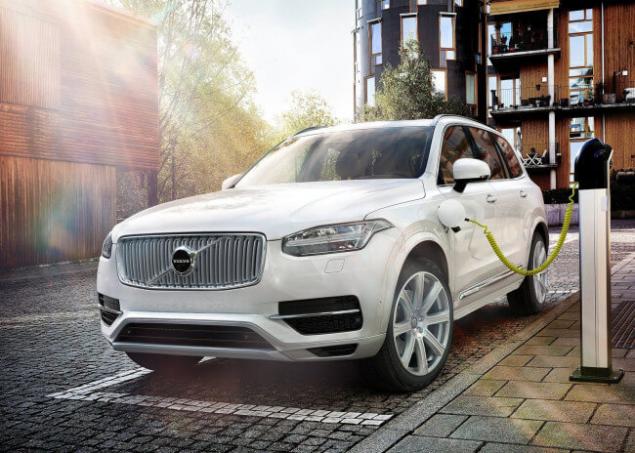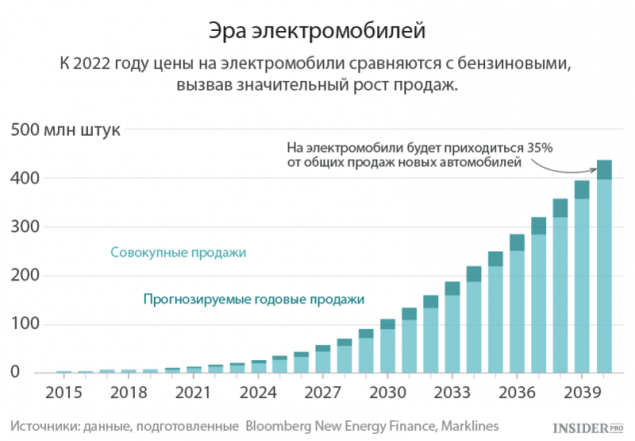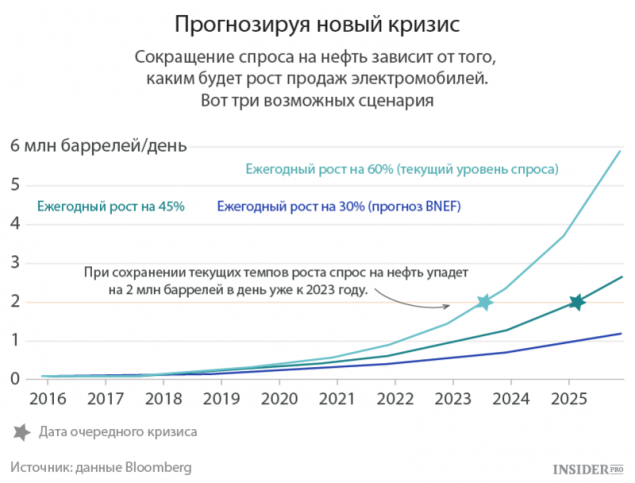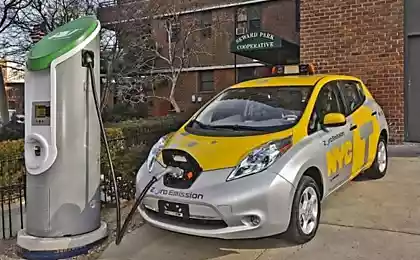550
Electric cars will cause a new oil crisis
New technologies will lead to wide spread of electric vehicles in the next decade.
In technology development there comes a time when to buy alternatives becomes meaningless. Remember about smartphones in the last ten years, the color TV in the 70s or gasoline-powered cars early last century. To predict the timing of these shifts is difficult, but when they happen, the whole world is changing.
Ahead of the era of electric cars
Last year the cost of the batteries fell 35%. Analysis of the electric car market, by Bloomberg New Energy Finance (BNEF) shows that in the next six years they at a cost equal to petrol. This will be the start of real mass market for electric cars.

It is projected that by 2040 electric cars with a large reserve will be worth less than 22 thousand dollars (in current prices). 35% sold in the world of cars will be electric.
Oil markets are not prepared for such a development, and it is easy to understand why. Today, electric vehicles account for only 0.1% of the world market of cars. On the streets of most cities, they are rare, thus are much more expensive than petrol counterparts. According to estimates by OPEC, by 2040 electric cars will account for only 1% of the total number of machines.Last year, ConocoPhillips CEO Ryan lance said that in the next 50 years electric cars will not have a significant effect on the market.
However, what is already known: in the next couple of years, Tesla (NASDAQ: TSLA), Chevrolet and Nissan plan to start sales of electric cars with great reserve, for around 30 thousand dollars. Other automakers are investing billions in the development of dozens of new models. By 2020 some of them will be better and cheaper than gasoline counterparts. The goal is to repeat the success of the Tesla Model S, which currently controls the segment of luxury cars in the United States. Then the question arises, how much for electric cars will drop the demand for oil? Whether the demand reduction is sufficient to cause another oil crisis

First of all it is necessary to estimate how quickly sales will grow
Last year, sales of electric cars in the world increased by 60%. It's an interesting number, because it coincides with the projected company Tesla in the period up to 2020. That kind of growth helped the model T from Ford to win the market in the 1910s. For comparison, sales of solar panels follow a similar path, adding every year by 50%, while demand for led bulbs for the year growing by around 140%.
The increase in sales of electric vehicles by 60% per year will reduce oil demand by 2 million barrels per day already by 2023. The glut of oil on the market would be equivalent to that caused the oil crisis of 2014.
Compound annual growth rate of 60% can't last forever — the estimate is too aggressive. In his analysis, BNEF uses a more methodical approach, laying out the electric vehicles at the cost of their parts. So you can predict when prices will fall enough to attract the average consumer. Using the model BNEF, the market has overcome the threshold level of 2 million barrels a day a few years later, in 2028-m. Such forecasts are at best unreliable. Can at most be expected that they will be rather dominant in the oil industry point of view, predicting weak interest in electric vehicles in the future.
Salim morsy, analyst at BNEF said: "If you look at the forecasts of OPEC or Exxon, they believe that demand will grow by about 2%. Regardless of which in 2040 will be the final figure — 25% or 50%, it's not as important as the fact that the demand for electric cars will be massive".
The BNEF analysis focuses on total cost of ownership of electric vehicles, including maintenance, cost of fueling, and — most importantly — the cost of the batteries.
Batteries make up a third of the cost of the establishment of electric vehicle. To ER is widespread, should be one of four:
The first three processes are already underway, however, they can't last forever. Fortunately, the cost of the batteries moving in the right direction.
The equation there is another side: where will all the necessary electricity? BNEF estimates that by 2040 electric cars will consume 1900 TWh, equivalent to 10% of the electricity produced by humanity in the past year.
The good news is that the electricity is getting cleaner. Since 2013, the world adds more generating capacity from wind and solar than from coal, gas and oil combined. Electric cars will reduce the cost of storage batteries and will allow to store the unstable energy from the sun and wind. The development towards efficient grids, electric vehicles and renewable energy creates a mutually beneficial terms of consumption.
What about the lithium and other scarce materials used in the batteries? BNEF analyzed these markets and found that the problems on them is not expected. By 2030 the production of batteries will be spent less than 1% of the prospected reserves of lithium, Nickel, manganese and copper. Take 4% of the global reserves of cobalt. After 2030, production is likely to switch to other materials, and the batteries will become lighter, smaller and cheaper.

Oil markets remain reasons for skepticism
Producers have yet to reduce the price of electric vehicles, in addition, yet not enough charging stations for long distance travel. The majority of new buyers in China and India will continue to prefer petrol and diesel cars. The growing demand for oil from developing countries may outweigh the impact of electric cars, especially if its price falls below $20 per barrel and will stay there.
Another unknown in the BNEF study — a growing number of Autonomous cars and services like Uber and Lyft. The mileage of these cars is more than 30 thousand km per year — more than the car in the path, the better the battery becomes. BNEF estimates that, if new services are successful, the market share of electric vehicles could rise to 50% by 2040.
One can say with certainty: whenever there was another oil crisis, it will be only the beginning. With each subsequent year the number of electric cars on the roads will grow, reducing demand for oil.published
P. S. And remember, only by changing their consumption — together we change the world! © Join us at Facebook , Vkontakte, Odnoklassniki
Source: insider.pro/EN/article/70677/
In technology development there comes a time when to buy alternatives becomes meaningless. Remember about smartphones in the last ten years, the color TV in the 70s or gasoline-powered cars early last century. To predict the timing of these shifts is difficult, but when they happen, the whole world is changing.
Ahead of the era of electric cars
Last year the cost of the batteries fell 35%. Analysis of the electric car market, by Bloomberg New Energy Finance (BNEF) shows that in the next six years they at a cost equal to petrol. This will be the start of real mass market for electric cars.

It is projected that by 2040 electric cars with a large reserve will be worth less than 22 thousand dollars (in current prices). 35% sold in the world of cars will be electric.
Oil markets are not prepared for such a development, and it is easy to understand why. Today, electric vehicles account for only 0.1% of the world market of cars. On the streets of most cities, they are rare, thus are much more expensive than petrol counterparts. According to estimates by OPEC, by 2040 electric cars will account for only 1% of the total number of machines.Last year, ConocoPhillips CEO Ryan lance said that in the next 50 years electric cars will not have a significant effect on the market.
However, what is already known: in the next couple of years, Tesla (NASDAQ: TSLA), Chevrolet and Nissan plan to start sales of electric cars with great reserve, for around 30 thousand dollars. Other automakers are investing billions in the development of dozens of new models. By 2020 some of them will be better and cheaper than gasoline counterparts. The goal is to repeat the success of the Tesla Model S, which currently controls the segment of luxury cars in the United States. Then the question arises, how much for electric cars will drop the demand for oil? Whether the demand reduction is sufficient to cause another oil crisis

First of all it is necessary to estimate how quickly sales will grow
Last year, sales of electric cars in the world increased by 60%. It's an interesting number, because it coincides with the projected company Tesla in the period up to 2020. That kind of growth helped the model T from Ford to win the market in the 1910s. For comparison, sales of solar panels follow a similar path, adding every year by 50%, while demand for led bulbs for the year growing by around 140%.
The increase in sales of electric vehicles by 60% per year will reduce oil demand by 2 million barrels per day already by 2023. The glut of oil on the market would be equivalent to that caused the oil crisis of 2014.
Compound annual growth rate of 60% can't last forever — the estimate is too aggressive. In his analysis, BNEF uses a more methodical approach, laying out the electric vehicles at the cost of their parts. So you can predict when prices will fall enough to attract the average consumer. Using the model BNEF, the market has overcome the threshold level of 2 million barrels a day a few years later, in 2028-m. Such forecasts are at best unreliable. Can at most be expected that they will be rather dominant in the oil industry point of view, predicting weak interest in electric vehicles in the future.
Salim morsy, analyst at BNEF said: "If you look at the forecasts of OPEC or Exxon, they believe that demand will grow by about 2%. Regardless of which in 2040 will be the final figure — 25% or 50%, it's not as important as the fact that the demand for electric cars will be massive".
The BNEF analysis focuses on total cost of ownership of electric vehicles, including maintenance, cost of fueling, and — most importantly — the cost of the batteries.
Batteries make up a third of the cost of the establishment of electric vehicle. To ER is widespread, should be one of four:
- The government will offer incentives to reduce the cost.
- Manufacturers go on extremely low profitability.
- Buyers are willing to pay more for electric cars.
- The cost of the batteries will fall.
The first three processes are already underway, however, they can't last forever. Fortunately, the cost of the batteries moving in the right direction.
The equation there is another side: where will all the necessary electricity? BNEF estimates that by 2040 electric cars will consume 1900 TWh, equivalent to 10% of the electricity produced by humanity in the past year.
The good news is that the electricity is getting cleaner. Since 2013, the world adds more generating capacity from wind and solar than from coal, gas and oil combined. Electric cars will reduce the cost of storage batteries and will allow to store the unstable energy from the sun and wind. The development towards efficient grids, electric vehicles and renewable energy creates a mutually beneficial terms of consumption.
What about the lithium and other scarce materials used in the batteries? BNEF analyzed these markets and found that the problems on them is not expected. By 2030 the production of batteries will be spent less than 1% of the prospected reserves of lithium, Nickel, manganese and copper. Take 4% of the global reserves of cobalt. After 2030, production is likely to switch to other materials, and the batteries will become lighter, smaller and cheaper.

Oil markets remain reasons for skepticism
Producers have yet to reduce the price of electric vehicles, in addition, yet not enough charging stations for long distance travel. The majority of new buyers in China and India will continue to prefer petrol and diesel cars. The growing demand for oil from developing countries may outweigh the impact of electric cars, especially if its price falls below $20 per barrel and will stay there.
Another unknown in the BNEF study — a growing number of Autonomous cars and services like Uber and Lyft. The mileage of these cars is more than 30 thousand km per year — more than the car in the path, the better the battery becomes. BNEF estimates that, if new services are successful, the market share of electric vehicles could rise to 50% by 2040.
One can say with certainty: whenever there was another oil crisis, it will be only the beginning. With each subsequent year the number of electric cars on the roads will grow, reducing demand for oil.published
P. S. And remember, only by changing their consumption — together we change the world! © Join us at Facebook , Vkontakte, Odnoklassniki
Source: insider.pro/EN/article/70677/
16 SUPER exercises for maintaining health
A TERRIFIC in his wisdom and the depth of the letter of UMBERTO ECO's grandson























